09 Jan GI Joe Comes Home
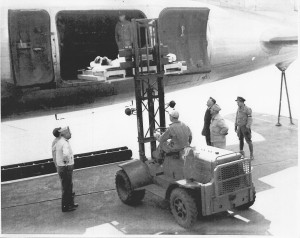
Litters of GI casualties – precious cargo – are carefully lifted from the ambulance plane. March 1945.
In May of 1945 a magazine titled “A Journal for Nurses” featured a story about the sick and injured soldiers who were being flown in ambulance planes back to the states. The name of the article was “GI Joe Comes Home.”
In March of that year one of the casualties flying to Mitchell Field on Long Island and the inspiration for the story happened to be Sgt. Joseph Ducato of the 9th infantry. This “GI Joe” has always been “Uncle Joe” to me.
Joe Ducato was seven years old when he, his mother, and his two sisters traveled from Sicily on a passenger boat to join their father in the United States. Instead of arriving in New York the boat went straight to Providence, Rhode Island. Joe’s Dad had to take the train up to meet them. After visiting with family in Brooklyn, they went first to Buffalo, then settled permanently in Erie, Pennsylvania.
On June 12, 1942, Joe was officially drafted into the army and sent to Camp Wheeler, Georgia for 14 or 15 weeks of basic training. After that it was Fort Bragg, North Carolina where he joined the 9th Infantry Division.
Joe’s first overseas destination on November 8, 1942 was Safi, North Africa, near Casablanca. “We fought through North Africa until we kicked Rommel out.”
By July of ’43 his unit arrived in Sicily to fight for control of this German stronghold. Joe landed at Palermo on a passenger boat late at night. A German plane strafed the boat but miraculously no one was hurt.
Soon after Joe arrived in Sicily he went to his commander and pointed off into the distance, “Sir, I was born on the other side of that ridge. If you don’t give me permission to see my family, I’ll have to go ‘over the hill.’ ”
Sure enough, as soon as the campaign was over Joe got a 72 hour leave to visit his Grandparents, aunts, uncles, and cousins in Bagheria, about three miles from Palermo. Joe hitchhiked to get there.
“Two cops picked me up. My Italian was so good that at first they thought I had surely killed an American and stolen his uniform! Thankfully I was able to talk myself out of it. After they dropped me off I was walking up the street toward my Grandfather’s house. A man stopped me and asked, ‘Are you Joe?’ He had been an apprentice in my uncle’s shoe shop. I hadn’t been in Sicily since I was seven years old but he recognized me.”
For three days Joe was wined and dined by his family. They cooked fresh fish outdoors and served him all their favorite foods. One of his uncles had a lemon grove with 1800 trees. His grandfather took him back to camp on a wagon pulled by a donkey with a gallon of wine for Joe’s company commander.
After Sicily, Joe went to England and was stationed about 50 miles north of London to train for the invasion. He was there from Thanksgiving of 1943 until the following June when his unit landed on the beaches. “We relieved the boys who fought their way in. We had it a little easier.”
For the rest of the year and into 1945 the GI’s fought their way through France until they reached Germany. The 9th was in the process of making connections with General Patton’s 3rd Army.
What was it like? “When you heard something coming toward you, you hit the ground. We had to dig our own trenches wherever we went. Every time we moved we would dig another hole. We slept in the trenches but there’s no sleeping when you’re in combat.”
I asked him what was his worst memory of that year. He answered that he doesn’t talk about the tough times but one that stands out was when the Germans were shooting at our paratroopers as they dropped to the ground. “They were helpless. It was an awful sight, one I’ll never forget.”
Next during my interview “Uncle Joe” went on to tell me that on March 8, 1945, he crossed the Remagen Bridge, under fire, over the Rhine into Germany.
The Bridge at Remagen? No way! Did you ever see that movie? “No, and I don’t think I want to either. It was all bad.”
As a Reconnaissance Sergeant one of Joe’s jobs was to go forward to the troops to see what supplies they needed … guns, ammo, whatever … then bring it all back to them. The next night, March 9th, around midnight Joe was alone in his jeep when a bomb exploded nearby. He was wounded in about 18 different places … both legs, his face. “I fell out of the jeep and crawled under the bottom of a fence as far as I could until a guard heard me.”
He went to a military hospital in Paris but not for long. The ambulance plane left Paris on Sunday at 2 pm and arrived at Mitchell Field on Monday at 1 pm on March 26, only seventeen days after his injury.
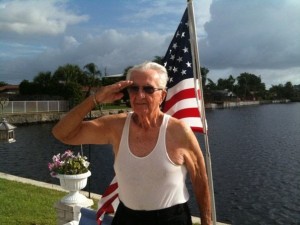
Sgt. Joseph Ducato ~ “Uncle Joe” ~ at his home in Florida. He’s never forgotten how fortunate he was to come home, even if it was in an ambulance.
Joe remembers very little about that trip. “We were pretty doped up.” After the plane landed, the litters were carefully lowered from the plane on a platform lift that minimized jarring. Field personnel called greetings as each casualty was carefully moved to an ambulance.
Joe had casts on both legs, one from neck to waist, another on his left arm and bandages on his right arm. Plus there was a bandage of his nose. He only had two free fingers to hold a glass of milk while he answered routine questions.
By March 28th he was at Deshon VA Hospital in Butler, Pennsylvania … near enough for his family to visit him. He was discharged exactly one year later and the year after that he married his sweetheart Dorothy. They had three children and lived in Erie until Joe decided that he needed to move to a warmer climate. He still has shrapnel in his knee and in back of his teeth.
“What do I remember the most? The nurses and the Red Cross volunteers. They were all wonderful. The rest of it, I try not to think about.”
From North Africa to Sicily to Normandy through France into Germany over the Bridge at Remagen. We can never thank our veterans enough.
Update February 3, 2013
Uncle Joe’s daughter Nancy just sent me a photos of this wartime newspaper article describing her Dad’s visit to his relatives in Sicily.


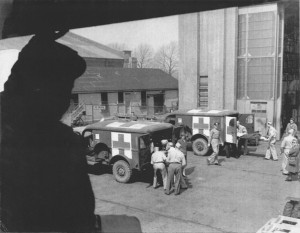
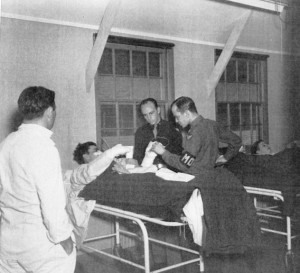
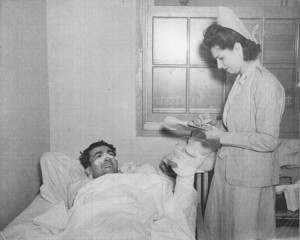
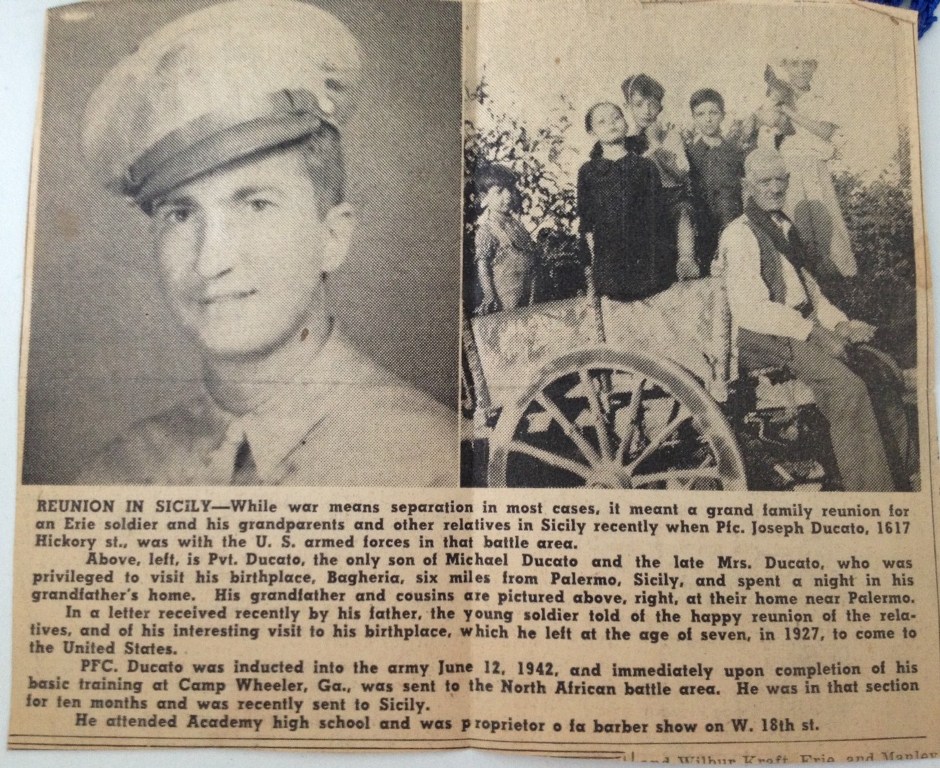
Kathie Sivillo`
Posted at 19:11h, 09 Januaryhave known Joe for so many years and this is the first time I’ve heard this story. Always knew he was special
Barbara Ann
Posted at 05:59h, 11 JanuaryWhat a fascinating story about Uncle Joe! These real life stories are special. Thank you!
Nancy Ducato
Posted at 08:14h, 07 FebruaryI am so very proud of my Dad, Joe Ducato. He is a true Hero to so many people. I love you Dad. I am very grateful that you are my Dad! XOXO Hugs
Giovanni Bartolone
Posted at 09:41h, 29 MarchBella storia che riporta ai tragici giorni della II guerra mondiale a Bagheria. Nice talk, to remember the bad WWII’s days in Bagheria. Saluti da Bagheria. Greeting from Bagheria.
Pat DiGeorge
Posted at 09:54h, 29 MarchI am thrilled that you have commented from Italy. Thank you!
Nancy Ducato
Posted at 10:55h, 29 MarchHello Giovanni Bartolone, I will have my Dad read your comment and write back. Thank you so much for the response. It will make my Dad’s day! Happy Easter!
Giovanni Bartolone
Posted at 12:12h, 29 MarchHello, Thank you for your words. Before I read Joe’s Ducato talk, I was a little sad. I bought a photo on Bagheria during WWII in Ebay, in German. I didn’t receive it. I am a researcher on WWII in Sicily, and I was looking for news on Bagheria in that hard days. I was very happy to read Joe’s talk and to see a photo of Bagheria in 1943. Many soldiers like Joe meet their relatives in Sicily in 1943. They helped them, with food, dresses, and medicines, like pennicellina, unknowed in Sicily. War was very hard for Sicily. Lack of food, lack od medicines, air bombing,….
Now, I’ m happy .
Good Easter for you from Bagheria.
Giovanni Bartolone
Jan Hinson
Posted at 21:11h, 10 AprilGreat story. I wonder if my father ever met Joe. The world owes a debt of gratitude to all of the brave who served selflessly in WWII. Thank you Joe!